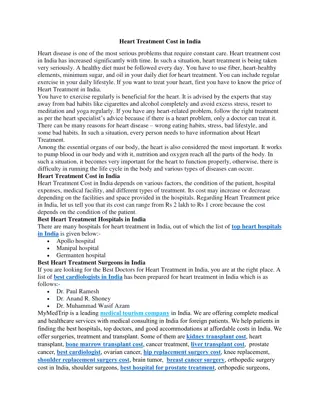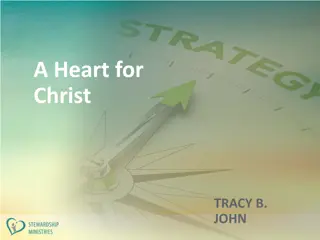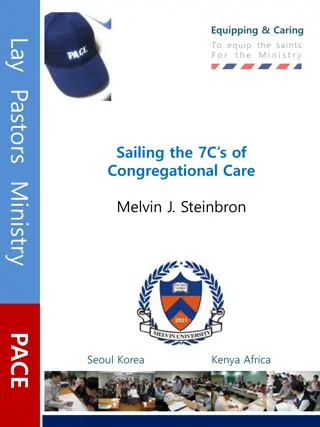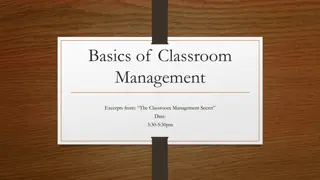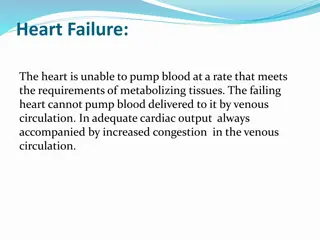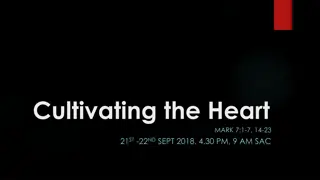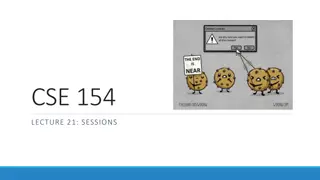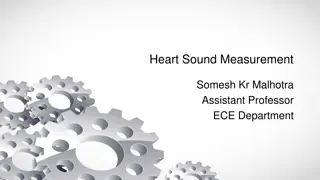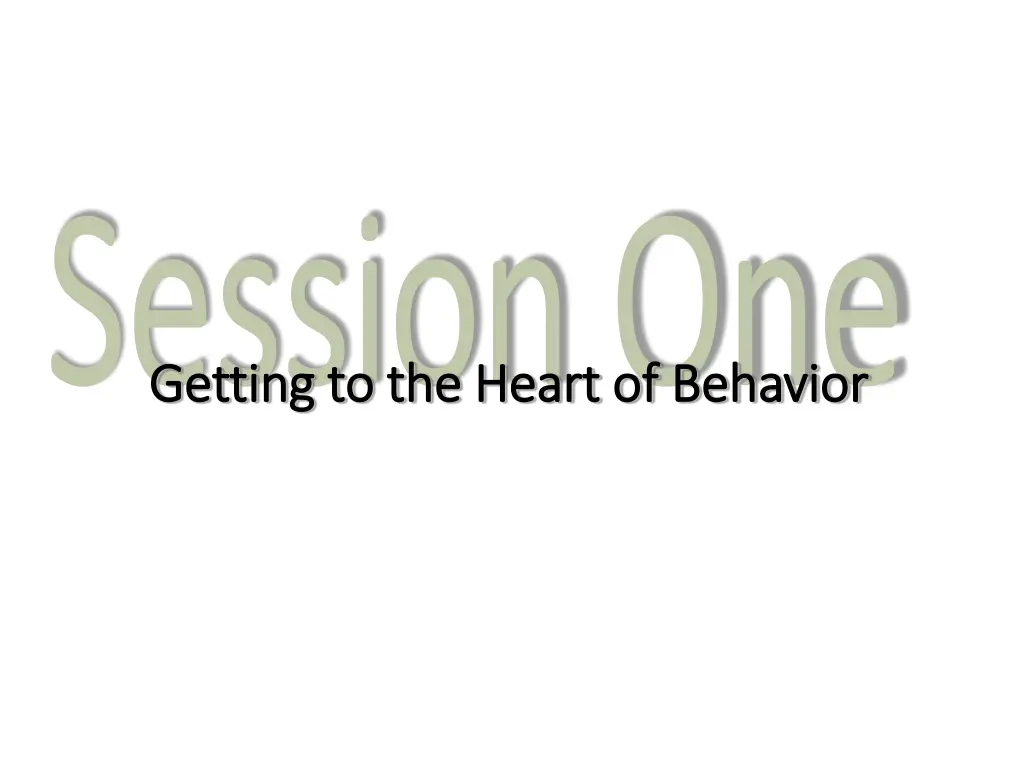
Understanding Behavior Through the Lens of the Heart
Explore the connection between behavior and the heart in this insightful content discussing the activities of the heart and their implications on behavior. Delve into biblical teachings and shepherding the heart to nurture a meaningful understanding of behavior rooted in the essence of the heart.
Download Presentation

Please find below an Image/Link to download the presentation.
The content on the website is provided AS IS for your information and personal use only. It may not be sold, licensed, or shared on other websites without obtaining consent from the author. If you encounter any issues during the download, it is possible that the publisher has removed the file from their server.
You are allowed to download the files provided on this website for personal or commercial use, subject to the condition that they are used lawfully. All files are the property of their respective owners.
The content on the website is provided AS IS for your information and personal use only. It may not be sold, licensed, or shared on other websites without obtaining consent from the author.
E N D
Presentation Transcript
Session One Session One Getting to the Heart of Behavior Getting to the Heart of Behavior
Christian school teachers work hard to apply Bible to all of life. We work hard to give students a biblical lens for seeing the world. We use the Bible as our standard for behavior. BUT we often turn to the culture s ideas and analysis for discipline, correction and motivation.
Above all else, guard your heart, for it is the wellspring of life. Proverbs 4:23
Activities of the Heart Mind Think Remember Know Discern Store things See Meditate Ponder
Activities of the Heart Emotions Fear Grieve Love God & others Hate Lust Pride Rejoice
Activities of the Heart Will Seek God Give Repent Believe
Implications for Understanding Behavior 1. The activities of the heart drive behavior. 2. Great areas in which to develop questions for kids. 3. Good Bible study for the classroom.
Major Old Testament Thread of Truth 1 Samuel 16:7 Deuteronomy 10:12 1 Chronicles 28:9 Proverbs 3:5-6 2 Chronicles 16:9 1 Kings 8:57-58
Matt 15:17-20 Mark 7:20-23 Luke 6:43-45 Behavior (say and do)
Behaviorism Evaluated 1. Real need is not addressed 2. False basis for ethics 3. The heart is wrongly trained 4. The gospel will not be central 5. Shows our idols of heart control convenience fear of man pride ease
Shepherding the Heart Bible reveals heart Hebrews 4:12 Shows where the action is James 4:1 Help your kids understand the heart Psalm 139:22-24 Psalm 26:2
Session Two Session Two Getting from Behavior to the Heart Getting from Behavior to the Heart
Heart Directs Behavior Matt. 15:17-20 Luke 6:43-45 Mark 7:17-23 Behavior (say & do) What our kids say and do flows from the heart. Prov. 4:23 Behavior can never be understood in isolation from the heart
Heart Directs Behavior Ungodly behavior Godly behavior Attitude Attitude Matt. 15:17-20 Luke 6:43-45 Mark 7:17-23 Behavior Behavior Fighting Sharing Behavior (say & do) What our students say and do flows from the heart. Prov. 4:23 Behavior cannot be understood in isolation from the heart.
Heart Directs Behavior Ungodly behavior Godly behavior Attitude Attitude Love of self Love of others Matt. 15:17-20 Luke 6:43-45 Mark 7:17-23 Behavior Behavior Fighting Sharing Behavior (say & do) What our students say and do flows from the heart. Prov. 4:23 Behavior cannot be understood in isolation from the heart.
Heart Directs Behavior Ungodly behavior Godly behavior Attitude Attitude Love of self Love of others Matt. 15:17-20 Luke 6:43-45 Mark 7:17-23 Behavior Behavior Fighting Sharing Behavior (say & do) What our students say and do flows from the heart. Prov. 4:23 Behavior cannot be understood in isolation from the heart.
Heart Directs Behavior Ungodly behavior Godly behavior Attitude Attitude Love of self Love of others Matt. 15:17-20 Luke 6:43-45 Mark 7:17-23 Behavior Behavior Fighting Sharing Behavior (say & do) What our students say and do flows from the heart. Prov. 4:23 Behavior cannot be understood in isolation from the heart.
Ungodly Attitudes vengeance fear of man pride love of self self-preservation fear covetousness envy hatred anger bitterness approval anxiety & fear rebellion Godly Attitudes entrusting to God fear of God humility love for others laying down life perfect love generosity good of others love peace-making forgiveness God s approval peace & contentment submission
Profound need for grace Key text: Ezekiel 36:25-27 We need cleansing We need to have our idols removed We need heart transplant Replacing stone with flesh We need empowerment by Spirit
Heart Directs Behavior Ungodly behavior Godly behavior Attitude Love of self Attitude Love of others Matt. 15:17-20 Luke 6:43-45 Mark 7:17-23 repent faith Behavior Fighting Behavior Behavior (say & do) Sharing
Session Three Session Three Consequences: Sowing & Reaping, Part 1 Consequences: Sowing & Reaping, Part 1
Definitions Definitions Definitions Behaviorism is constraining and controlling behavior through a system of rewards and punishments. Biblical correction, discipline and motivation is instruction and discipline that uses the enduring truth of Scripture to inform the heart and direct the behavior. Students must live consistently with God s Law. Heart change is our most important goal.
Two means of shepherding in the classroom A. Formative Instruction B. Corrective Discipline
1. Formative Instruction gives a biblical foundation, a Christian world-view, ways of thinking that are rooted in Scripture. a. God s word is the measure of everything - not our words. b. The Scriptures are not a club. c. Sets biblical truth apart from human wisdom d. God establishes his right to speak and our right to speak.
e. Class Goals - derived from principles and absolutes of Scripture 1. Honor for God 2. Respect for authority 3. Respect for others 4. Productive atmosphere
Teach your students the truth about consequences Sowing and Reaping (Gal 6:7-8) Do not be deceived: God can- not be mocked. A man reaps what he sows. The one who sows to please his sinful nature, from that nature will reap destruction; the one who sows to please the Spirit, from the Spirit will reap eternal life.
Consequences Compared Sowing & Reaping 1. Related as much as possible to the problem Behaviorism 1. Often unrelated to behavior grounding 2. Internal under- scoring the princi- ples of Scripture 2. External and manipulative 3. Process oriented for student s eternal benefit 3. Event oriented and temporary - often for teacher s benefit
Consequences Compared (cont.) Sowing & Reaping 4. Concerned with fruit that endures godly character for usefulness in the Kingdom Behaviorism 4. Controls and constrains behavior - often for wrong motives 5. God s law is the standard and path of blessing. 5. Teacher s personal standards are the rule for behavior. -
Two Types of Consequences 1. Natural - what happens if no one interferes 2. Shaped by parents / teachers who determine the outcome that will under-score the principles of the Word of God Must be: 1. Reasonable - not extreme or excessive 2. Logical - connected to what went wrong 3. Spiritual - there is more to reaping than the immediate temporal consequence.
Deeper Dimensions of Reaping Psalm 1, Psalm 73 1. Relationship with God God will not be mocked. 2. Habits for life Bad habits will prove hard to shake. 3. Reputation How do you want to be considered? 4.Relationship Behavior impacts all relationships. 5. Long term / eternal outcomes Lifetime usefulness is at stake. -
Session Four Session Four Consequences: Sowing & Reaping, Part 2 Consequences: Sowing & Reaping, Part 2
Review Two means of shepherding in the classroom A. Formative Instruction B. Corrective Discipline
Deeper Dimensions of Reaping Psalm 1, Psalm 73 1. Relationship with God God will not be mocked. 2. Habits for life Bad habits will prove hard to shake. 3. Reputation How do you want to be considered? 4.Relationship Behavior impacts all relationships. 5. Long term / eternal outcomes Lifetime usefulness is at stake. -
Children, obey your parents in the Lord, for this is right. Honor your father and your mother which is the first commandment with a promise that it may go well with you and that you may enjoy long life on the earth. (Ephesians 6:1-3) Obey Long life Go well Honor
Corrective Discipline Reaping Process 1. Ask questions to draw out the student. 2. Remind of formative instruction. 3. Help them understand the serious outcomes to their behavior. 4. How can I help you? 5. Let them know what you expect. You must. . . You may not. . . 6. In light of sowing. . . you will reap. . . 7. Opportunity for student to respond 8 . Prayer with / for the student.
We dont do this work for results but to be faithful to the work God has given us to do. Consequences do not serve as power plays to prove our role, or power, or strength, or to put students in their place for our convenience, or to insure control in the classroom. They are designed by God to display the reality of God s ultimate rule in the affairs of men and to extend mercy while there is still time to repent and trust in God.
IMPLICATIONS for us - the teachers? A. We must learn to identify hollow and deceptive philosophies we have been taken captive by. We must get trans- formed minds. Romans 12:1, 2 Colossians 2:6, 7, 8, 9 1. HOW: a. Know the Scriptures Deut. 32: 45-47, Joshua 1:6-9, Joshua 23:6, 7,Hebrews 4:12 Ps. 119:44, 45
b. Prayer c. Self-shepherding Deut. 6 d. THEN teach them to your children. Psalm 34
Illustrations 1. Obedience issues BEHAVIOR: "Come to seat, stay in seat, line up, stop talking, give attention..." a. Ask questions to draw out. b. Remind of formative instruction. Eph. 6:1-3 - circle of blessing. c. There are serious outcomes that you are reaping for the sin you have sown. Obedience is for your good... you are the beneficiary. Consequences: censure, mistrust, reputation, loss of privilege
d. How can I help you? e. You must - you may not continue. f. In light of sowing your sin of... you will reap g. Prayer and opportunity to respond. 2. Lying and deceit BEHAVIOR: "Billy said Eddie hit him..." OR deceit - turning in incomplete work, passing notes. a. Ask questions to draw out. b. Remind of formative instruction. Ps. 51:6; 19:14; Pro.16:13
c. There are serious outcomes that you are reaping for the sin you have sown. Proverbs 25:11; 6:16-19; 19:5, 9, 22 d. How can I help you? e. You must - you may not continue. f. In light of sowing your sin of... you will reap... g. Prayer and opportunity for student to respond.
3. Disregard for others BEHAVIOR: Conversations that purposefully exclude; Monopolizing friendships - small classroom someone is left out; Going to relationships with needs - not giving; Picking on others... a. Ask questions to draw out. Ask what thinking, feeling was - who is important? Why? b. Remind of formative instruction. Philippians 2, James 3, Galatians 5, Ephesians 4:30-32
c. There are serious outcomes that you are reaping for the sin you have sown. Failure brings consequences loneliness, not able to use gifts, mistrust - reputation d. How can I help you? e. You must - you may not continue. f. In light of sowing your sin of... you will reap... g. Prayer and opportunity to respond. Positively - fellowship, means of grace of the body, one-anothering
Session Five Session Five Helping Parents Shepherd Their Children Helping Parents Shepherd Their Children
Helping Parents Shepherd Their Children I. Introduction A. We re teachers of students; why help parents? 1. We have a biblical mandate. 2. Parents are primary shepherds. 3. Our ministry is extended beyond the classroom; insures long term ministry.
B. Why is it so hard? 1. Hollow and deceptive philosophies Col 2:8 2. Conformity to the pattern of the world, Rom 12:1-2 a. Parenting = child care b. Behaviorism = successful management c. Teaching methods, models d. Educational Psychology and disorders e. Educational goals
II. Two Dimensions of this helping/training process A. Formative instruction gives parents biblical ways to think about their children B. Corrective intervention the ministry of calling students back to the circle of safety
III. Talking to Parents A. Administration 1. Handbooks and brochures 2. Enrollment interviews 3. Orientation meetings 4. Publications 5. Seminars
B. Teacher WHEN: 1. Teacher s fall class parent- student meetings HOW: a. Worldview b. Class goals 1. In relationship to God 2. In student/parent relationships 3. In relationship to others 4. In relationship to the educational task
c. Correction and discipline d. Class concordance/devotions & chapel e. Expectations WHEN: 2. Casual interaction with parents HOW: a. Ephesians 4:29 b. Leviticus 19:15-18



